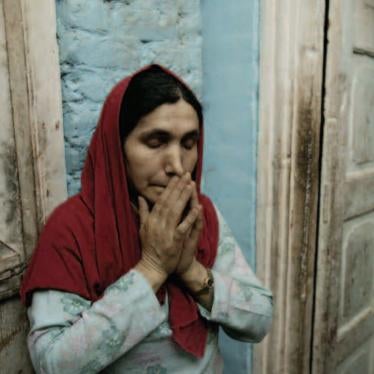(New York) - The Indian government must thoroughly investigate and prosecute members of the security forces responsible for the extrajudicial execution of a carpenter and two laborers in Jammu and Kashmir, Human Rights Watch said today. The investigation and prosecution must be impartial and transparent for justice to be done.
Abdul Rahman Paddar, a carpenter, was reported missing in Srinagar city in December 2006. Police, during routine investigations into his disappearance, traced his mobile phone to an assistant police sub-inspector named Farooq Ahmad. When questioned, Farooq Ahmad admitted that Abdul Rahman had been picked up from Srinagar city by a Gandherbal district police special operations squad and killed. Although Abdul Rahman had been reported missing by his family, the police later identified him as a Pakistani militant and claimed that he had been killed in an armed encounter during joint operations by the special operations squad and the paramilitary Central Reserve Police Force.
Two other deaths mentioned during the interrogation are also being investigated by Jammu and Kashmir police. Nazir Ahmad Deka was allegedly picked up from Srinagar and killed in adjoining Gandherbal district in February 2006. He was identified as a “foreign militant” killed during a so-called encounter between alleged militants and a joint operation of the police and the army. The third man, Ghulam Nabi Wani, was killed in March 2006, and again identified as a “foreign militant” killed during a joint police-army operation.
“This epidemic of fake ‘encounter killings’ by the security forces has plagued Kashmir for too long,” said Brad Adams, Asia director at Human Rights Watch. “The police must stop their standard operating procedure of killing people in custody.”
The Gandherbal police received cash rewards for the so-called operation in which Abdul Rahman was killed. The police had claimed that they had killed a Pakistani militant called Abu Hafiz.
According to Jammu and Kashmir State Chief Minister Ghulam Nabi Azad, police official Farooq Ahmad and a constable have been arrested for the murder of Abdul Rahman and the killings are still being investigated. “Any security person found guilty of killing any innocent for personal reasons like promotion, rewards or appeasement to bosses would not be spared,” Azad said, adding that “nobody is above the law.”
“The real test of the chief minister’s commitment to investigate the Abdul Rahman killing is whether all those responsible, including senior officials who authorized it, are successfully prosecuted,” said Adams. “Too often we find that India’s security forces are deemed ‘above the law’ and are spared criminal prosecution despite committing grave human rights abuses.”
The coalition Jammu and Kashmir government came to power in 2002 with the promise of “zero tolerance” for human rights abuses. Ghulam Nabi Azad, who became chief minister in November 2005, has claimed a significant drop in custodial killings since he took charge. However, credible allegations of extrajudicial killings persist. On January 26, there were protests in Pattan over the killing of Muhammad Yaqoob Mir. While the army claimed to have killed a militant and recovered weapons from him after an armed encounter, Muhammad Yaqoob’s family said that the laborer had gone missing on January 21 and a missing person complaint had been lodged with the police.
In September 2006, Human Rights Watch released a report, “‘Everyone Lives in Fear’: Patterns of Impunity in Jammu and Kashmir,” calling on the state and national governments to investigate the problem of fake encounter killings and hold appropriate officials responsible. The report noted that the impunity provisions in Indian law offer a remarkable amount of legal protection to members of the armed forces and civilian officials implicated in criminal offenses. The law makes it mandatory to obtain permission from the government to initiate criminal proceedings against public servants, including armed forces personnel. Such permission is seldom forthcoming.
Extrajudicial executions by Indian security forces are common. Police and army officials have told Human Rights Watch that security forces often execute alleged militants instead of bringing them to trial in the belief that keeping hardcore militants in detention is a security risk. Most of those summarily executed are falsely reported to have died during armed clashes between the army and militants in “encounter killings.” This is done with the knowledge of superior officers, and has led to a culture where security forces feel they can murder persons in their custody for rewards and promotions. Kashmiris also told Human Rights Watch that security forces demand bribes or threaten civilians with extrajudicial executions, warning them that their bodies would be left in the jungle and identified as “foreign militants.”
Human Rights Watch said that if the Indian authorities had addressed government abuses earlier in the conflict, public confidence in the authorities would have increased and future abuses may have been substantially reduced. Instead, India failed to prosecute or discipline the perpetrators, who believe they are, indeed, “above the law.”
“The people of Kashmir are waiting for the state and national governments to end this system of impunity,” said Adams. “Human rights abuses and the failure of justice create despair in the valley and continue to fuel the conflict.”





